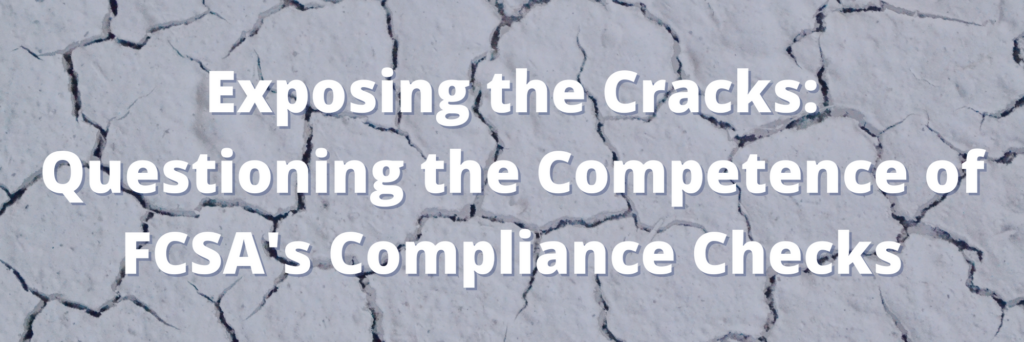Contractor Voice has dedicated itself to exposing malpractice in the umbrella industry, recently publishing several online posts revealing the non-compliance of the FCSA’s mandatory Code of Compliance by well-known FCSA umbrellas. This raises serious concerns about the effectiveness and thoroughness of the FCSA’s annual compliance checks. If the basic standards of the mandatory codes are being overlooked, what else is slipping through the cracks, and what liabilities are these oversights exposing contractors, agencies, and end users to?
The Continuous Pattern
Last year, we exposed Orange Genie for failing to provide a breakdown of employment costs on contractors’ payslips and clandestinely deducting an extra £2 in employer costs. However, the problem does not end there. Liquid Friday was investigated by the FCSA at the end of last year for not providing the same breakdown of employer costs. In the last few weeks, two other FCSA members, Brookson One and Parasol, are also neglecting to comply with this essential requirement. This recurring pattern raises questions about the diligence of the FCSA assessors who are responsible for ensuring compliance.
The Importance of Payslip Transparency
Providing a clear breakdown of employment costs on contractors’ payslips is not a mere formality nor an option; it is fundamental for transparency and enshrined in the FCSA codes. It empowers contractors to understand how their earnings and deductions are being calculated and ensures transparency in the financial transactions between umbrella companies and contractors. By omitting a transparent breakdown, these umbrella companies are leaving contractors in the dark and potentially misleading them about their pay and deductions. The additional £2 deduction that Orange Genie were obscuring in employment costs was only discovered and exposed due to forensically auditing their contractor’s payslips.
FCSA Compliance Checks: Inadequate and Ineffective?
The FCSA is the membership body responsible for overseeing compliance amongst its membership and boldly boasts to be the gold standard in the umbrella industry. Chris Bryce, FCSA’s CEO, confirmed to Contractor Voice that “membership of FCSA is founded on compliance with [the] Codes and the FCSA Charter and FCSA’s members understand their obligations to follow these.” The FCSA conduct annual compliance checks to ensure that umbrella companies are meeting the FCSA’s Code of Compliance. However, the exposure of four umbrella companies within a short span of time brings into question the competence and thoroughness of these checks, despite Mr Bryce confirming that these checks underpin the FCSA’s compliance standard and the “FCSA requires all members to comply with all Codes”.
If such basic compliance standards are being missed by the assessors, what other crucial requirements might be going unnoticed? Contractor Voice reached out to all of the FCSA assessors for comment, however, only Saffery Champness LLP responded, stating that they ”are subject to the ICAEW Codes of Ethics” and therefore “unable to respond”. Are umbrella companies adequately vetted to ensure their adherence to ethical practices and the well-being of contractors? The recent revelations regarding the lack of payslip transparency make us wonder if the FCSA assessors are truly equipped to identify and address malpractices within the industry. Despite these recent revelations, the FCSA has not acknowledged the seemingly widespread non-compliance of its membership to their Codes, nor have they stated how they are going to address this catastrophic concern, despite Mr Bryce confirming to Contractor Voice that if the FCSA “find evidence of non-compliance [they] will take appropriate measures to ensure compliance and/or take disciplinary action”.
Liabilities and the Need for Accountability
The failure to uphold compliance standards not only undermines the trust between contractors and umbrella companies but also exposes agencies to legal and reputational liabilities. By condoning non-compliance or failing to detect it, the FCSA allows unethical practices to persist within the industry. This inaction compromises the interests of contractors, potentially leaving them financially disadvantaged and lacking essential employment rights.
Conclusion
The exposure of multiple umbrella companies, all prominent and some founding FCSA members, failing to comply with the FCSA’s Code of Compliance raises serious concerns about the efficacy and competence of the annual compliance checks conducted by the FCSA assessors. If such basic requirements are overlooked, it begs the question of what other crucial aspects might be missed. The FCSA must take immediate steps to address these oversights, ensure greater transparency, and restore faith in their compliance process. Only by holding the FCSA and umbrella companies accountable can we protect the interests and rights of contractors within the industry in the absence of regulation.







